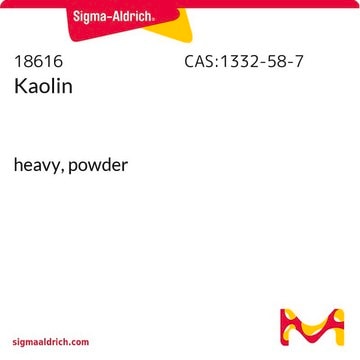60609
Kaolin
tested according to Ph. Eur.
Synonym(s):
Kaolinum ponderosum, Aluminum silicate hydroxide, Bolus, Hydrated aluminum silicate
Sign Into View Organizational & Contract Pricing
All Photos(1)
About This Item
Linear Formula:
~Al2Si2O5(OH)4
CAS Number:
EC Number:
MDL number:
UNSPSC Code:
11111803
NACRES:
NA.25
Recommended Products
Agency
USP/NF
tested according to Ph. Eur.
Quality Level
form
solid
application(s)
pharmaceutical (small molecule)
InChI
1S/2Al.O5Si2.2H2O.2O/c;;1-6(2)5-7(3)4;;;;/h;;;2*1H2;;/q2*+1;-2;;;;
InChI key
NLYAJNPCOHFWQQ-UHFFFAOYSA-N
Looking for similar products? Visit Product Comparison Guide
Application
- Cellulose fibres enhance the function of hemostatic composite medical sealants.: This study highlights the role of kaolin in the development of composite medical sealants, demonstrating its efficacy in improving hemostatic functions, crucial for surgical applications and wound management (Gilboa E et al., 2024).
- Development and characterization of a composite material with geopolymer matrix obtained by incorporation of microparticles from plastic bottles.: Investigates the use of kaolin in developing sustainable composite materials, showcasing its utility in recycling and environmental conservation (Bayiha BN et al., 2024).
- Isolation and characterization of Stenotrophomonas pavanii GXUN74707 with efficient flocculation performance and application in wastewater treatment.: Details the use of kaolin as a flocculating agent, enhancing microbial wastewater treatment, vital for environmental biotechnology and public health (Qin S et al., 2024).
- Sustainable Coating Materials: Exploring the Influence of Adjuvants on Kaolinite Suspension with Insights from Five Local Mining Clays.: This research assesses the impact of kaolin and other clays on the development of sustainable coating materials, contributing to advancements in materials science and eco-friendly technologies (Chanthaset N et al., 2024).
Storage Class Code
11 - Combustible Solids
WGK
nwg
Flash Point(F)
Not applicable
Flash Point(C)
Not applicable
Personal Protective Equipment
dust mask type N95 (US), Eyeshields, Gloves
Choose from one of the most recent versions:
Already Own This Product?
Find documentation for the products that you have recently purchased in the Document Library.
Customers Also Viewed
Ching-Wei Wu et al.
Journal of hazardous materials, 244-245, 412-420 (2013-01-01)
The process of mechanical milling has been found to effectively stabilize heavy metals in municipal solid waste incinerator (MSWI) fly ash, as well as to restrain the evaporation of heavy metals during thermo-treatment. This method is adopted in this study
Kenji Inaba et al.
The journal of trauma and acute care surgery, 74(2), 538-545 (2013-01-29)
The purpose of this study was to evaluate the long-term efficacy and safety of kaolin- and chitosan-based hemostatic agents for hemorrhage control in a 14-day survival, damage-control swine model of Grade IV liver injury. A total of 48 anesthetized pigs
Nicholas R Kunio et al.
American journal of surgery, 205(5), 505-510 (2013-03-19)
The purpose of this study was to compare standard gauze (SG) and advanced hemostatic dressings in use by military personnel in a no-hold model. A randomized, controlled trial was conducted using 36 swine. Animals underwent femoral arteriotomy, followed by 60
Salvador Cotillas et al.
Water research, 47(5), 1741-1750 (2013-01-29)
In this work, a novel integrated electrochemical process for urban wastewater regeneration is described. The electrochemical cell consists in a Boron Doped Diamond (BDD) or a Dimensionally Stable Anode (DSA) as anode, a Stainless Steel (SS) as cathode and a
B C A Pinheiro et al.
Journal of environmental management, 118, 205-210 (2013-03-05)
This study investigates the incorporation of solid petroleum waste as raw material into a porcelain stoneware tile body, in replacement to natural kaolin material by up to 5 wt.%. Tile formulations containing solid petroleum waste were pressed and fired at 1240 °C
Our team of scientists has experience in all areas of research including Life Science, Material Science, Chemical Synthesis, Chromatography, Analytical and many others.
Contact Technical Service











